Judge’s Role in a DUI Case
Many people have misguided notions about the judge's role in a drunk or drugged driving case; for instance, that they can appeal their driver's license penalties to the judge, or that all judges are subject matter experts in the area of impaired and intoxicated driving. However, this is simply not the case.
The Judge is not an Expert
Although many attorneys choose to focus or specialize in one area of the law—such as criminal defense, family law or drunk driving defense—the same is not always true of judges. It is true that many judges began their legal careers as trial attorneys or prosecutors; however, their role on the bench is vastly different from that of the prosecutor or defense attorney.
Judges maintain very busy schedules and hear cases involving all different aspects of the law throughout the day. It is not the duty of a judge to be an expert in the science behind blood alcohol testing or the mandated procedures involved in OWI investigations. In fact, judges rely on attorneys to educate them in the nuances of the laws and the legal precedents involved in individual cases.
Role of Judge Different in Bench Trial and Jury Trial
Because DUI is a crime you have an absolute right to have your case tried to a jury. With a misdemeanor DUI your jury will be composed of 7 citizens, 6 of which will decide your case. The remaining juror is seated as an alternate. A felony case is tried to a jury of 13 or 14 and will be decided by 12. Verdicts must be unanimous for either acquittal or conviction.
With a jury trial, the jury's role is that of factfinder. Juries are empaneled to resolve issues or questions of fact. An issue of fact in a drunk driving case might be whether you were driving on a place generally open to the public. Were you operating a "motor vehicle" or were you operating at all? The most obvious fact that may be in dispute is whether you were drunk.
Juries also decide what meaning to give chemical tests. If there was a .13 breath or blood test, then is this test reliable? Is it reliable enough to be proof beyond a reasonable doubt that the crime of drunk driving was committed? In a judge trial it is the judge who will be deciding all of these facts.
In a jury trial, juries are told that they must apply these facts to the law as given them by the judge. The judge will read to the jury the definition of reasonable doubt, but it is up to them to decide how to apply that definition to the facts as they find them. All of the applicable legal principles are set forth in standard jury instructions that the judge, prosecutor and defense attorney all agree upon.
In a jury trial, the judge's main responsibility is to maintain order over the legal proceedings and to rule on the legality of evidence provided by the prosecution and the defense. Leading up to the trial, the judge may also rule on various legal issues that might come up. For example, if there is an issue as to whether the operation took place on a highway or place generally open to the public, your attorney might ask the judge to dismiss the case. If the judge disagrees, then your attorney can ask the jury to decide that the area of operation was not open to the public. If the jury agrees, then an acquittal will result, even though the judge disagrees with the jury.
In a non-jury or bench trial, the judge will also decide all issues of fact. The judge will in such cases be acting as both the keeper of the law as well as the finder of fact. For a bench trial to occur both the prosecutor as well as the defense attorney must agree to it. The Michigan DUI Lawyers at the Barone Defense Firm rarely waive the jury. However, there is no hard and fast rule, and you should only decide this issue with the assistance of your lawyer.
If you are found guilty, the judge is also responsible for sentencing. This true regardless of whether you decide on a bench or jury trial.
 Barone Defense Firm Home
Barone Defense Firm Home
















